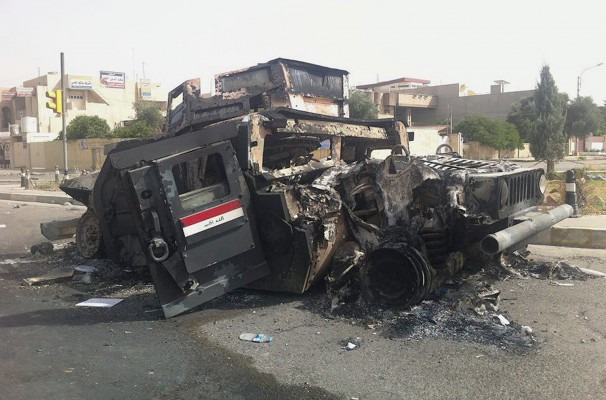The Iraqi collapse we are seeing on TV has been predictable and is related to the Obama decision to leave with no residual US presence. The reasons why the Iraqi army is dissolving are well known.
An Iraqi Hummvee.
A retired US general tells the story.
The day the U.S. forces left – because of the desire of our people and our politicians, but also because Prime Minister Nouri al-Maliki refused to sign a required and critically protective Status of Forces Agreement – the Iraqi Army began to deteriorate.
There were myriad reasons for this, besides our departure. Even before the U.S. forces left, American-trained leaders were being replaced with more and more “favored” officers from sects, tribes or families linked to the government. They weren’t chosen for their competency, a big mistake.
This is the history of Arab armies.
In my final tour, between 2007 and 2008, our soldiers did a great job reducing attacks in the north. I was able to observe and compare the capabilities of the four divisions of the Iraqi Army with the many units of the Kurdish pesh merga.
While both groups were becoming increasingly professional and capable, the connection between the pesh merga and the Kurdish government officials and Kurdish population was positive and vibrant. The same cannot be said of the Iraqi triad.
Beyond that, I also had the chance to engage with government officials, police, academics and doctors, lawyers, and women’s groups. The people we met were unfailingly professional and kind. And, almost universally, the Arab Iraqis and the Kurdish Iraqis were vocal in their frustration with the lack of action by “those in Baghdad” to attend to the matters of government: security, economic growth, services.
The attempt to “build a nation” in Iraq was possibly a worthwhile effort but it was abandoned too soon and cannot be revived.
Afghanistan will be even worse as it is far from the sea and evacuation will be much harder for the last US forces to leave.
Lord Elphinstone learned just how difficult it could be.
The Afghans launched numerous attacks against the column as it made slow progress through the winter snows of the Hindu Kush. In total the British army lost 4,500 troops, along with 12,000 mainly Indian camp-followers. The final stand was made just outside a village called Gandamak on 13 January.[3]
Out of more than 16,000 people from the column commanded by Elphinstone, only one European (Assistant Surgeon William Brydon) and a few Indian sepoys reached Jalalabad.
We have airplanes now but the distance to the sea is still intimidating Pakistan is no friend and Russia has no incentive to help. They lost nearly a thousand soldiers retreating to their border.
Tags: Afghanistan, Iran, iraq, politics
